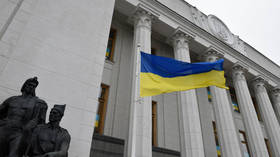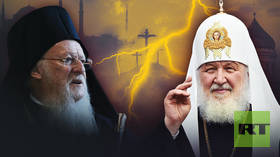Ukrainian MPs approve ban on largest Christian church

The Ukrainian legislature on Thursday approved in the first reading a bill aimed at banning organizations associated with Russia. Bill 8371 is widely understood to be targeting the canonical Ukrainian Orthodox Church without saying so directly, so as to avoid criticism from the West.
Of the 404 active members of the Verkhovna Rada, 267 voted in favor of the bill, 15 were against and two abstained.
Authors of the bill have declared that it will “allow citizens of Ukraine to realize the right to freedom of worldview and religion guaranteed by the Constitution of Ukraine.”
Officially, the bill bans the activities of “religious organizations associated with Russia.” President Vladimir Zelensky’s government considers the Ukrainian Orthodox Church (UOC) to fit this definition, as it maintains communion with the Moscow Patriarchate of the Russian Orthodox Church.
The UOC is the largest denomination in Ukraine. Though it denounced Russia in February 2022, when the Ukraine conflict escalated, the UOC has not declared itself autocephalous – independent – of the ROC. Meanwhile, the government in Kiev has set up a rival organization, the Orthodox Church of Ukraine (OCU), which the US-backed Ecumenical Patriarchate in Istanbul recognized as autocephalous in 2019.
According to the BBC, the bill took almost ten months to get on the parliamentary agenda due to opposition from within Zelensky’s ruling party, ‘Servant of the People’. Among those pressuring the Rada to pass it was Vassily Malyuk, the head of the Security Service of Ukraine (SBU), who argued it was needed to crack down on “collaborators” allegedly operating in its parishes.
Meanwhile, several UOC bishops have pleaded with the lawmakers to “think of their souls” ahead of the vote. The church has vowed to challenge the bill if it goes into effect, though all of its legal challenges so far have been rejected.
“Politicians are once again letting the religious beliefs of millions of Ukrainians be destroyed for their corporate intrigues,” Metropolitan Kliment, a spokesman for the UOC, told the BBC.
Kliment argued that the bill was part of the “de-Christianization” of Ukraine, adding that the very people championing it and the OCU “will vote tomorrow for the introduction of same-sex marriage in Ukraine, and after tomorrow I can’t even imagine what else.”
Bill 8371 would require the government’s bureau of “Ethnic Politics and Freedom of Conscience” to establish that a certain religious organization is based in Russia, after which it can order it to “correct” the matter. If that doesn’t happen, the government can ask a court to ban the denomination. However, the UOC is not a single legal entity. Ukraine would have to go after the Kiev Archdiocese, some 50 dioceses, and about 9,000 individual parishes.
While the legal proceedings could in theory take years, in practice the law can be held like the Sword of Damocles over the heads of the UOC leadership to compel their “cooperation,” or used as a pretext by local and regional authorities to seize church property, according to the BBC’s sources.
Seizures have already been underway for months. Seven of Ukraine’s regions have banned the UOC so far. In March, Zelensky’s government moved against the Kiev-Pechersk Lavra, one of the country’s oldest monasteries – and stormed the premises in August, after UOC monks refused to leave. Authorities in Kiev ordered the confiscation of 74 church properties in the Ukrainian capital last month. Many of the seized temples – including several churches inside the Pechersk Lavra – have been turned over to the government-backed OCU.
Moscow has accused Kiev of persecuting the canonical Orthodox church and Washington for tacitly approving Ukraine’s actions.













